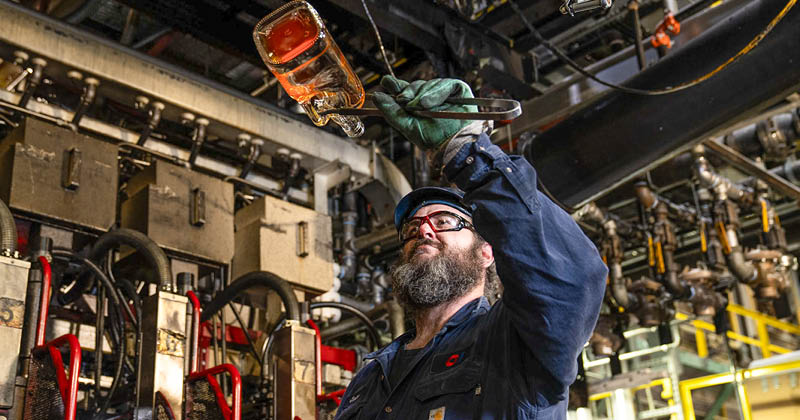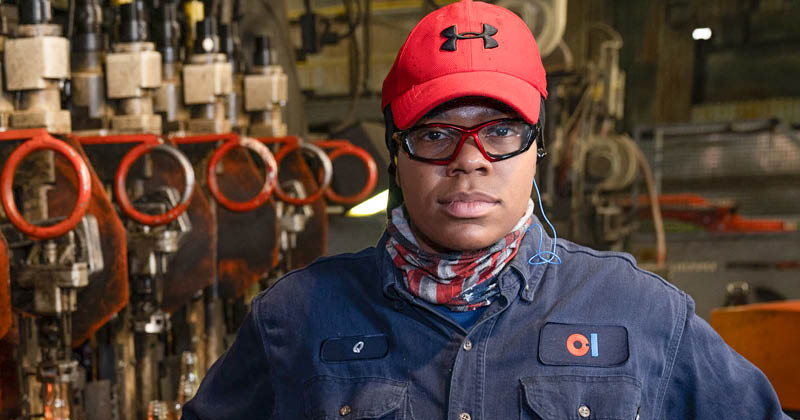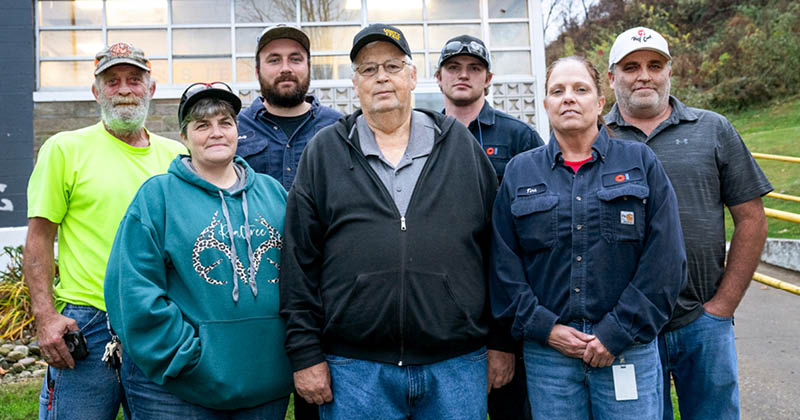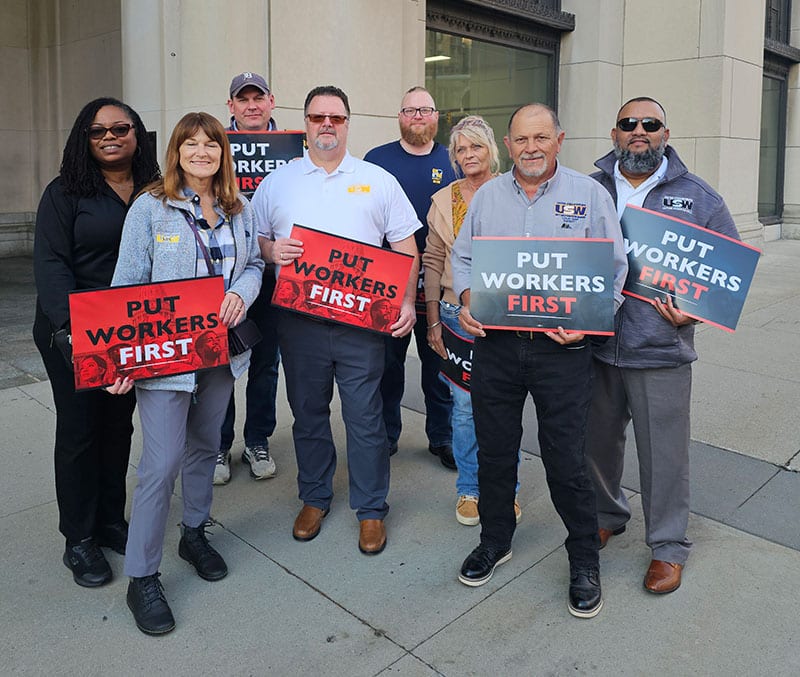Unbreakable Bonds: USW Glass and Mold Makers at Ohio Factory Fuel Economy While Producing Top-Quality Bottles

The following article was originally published in the Spring 2024 issue of USW@Work.
—
Tom Forker has worked at the Owens-Illinois glass factory in Zanesville, Ohio, for 48 years.
Over those nearly five decades, the 355 members of the four USW locals who work at the plant have become like family to him. And, in turn, six of his own family members, both children and grandchildren, have joined the work force at the plant.
The reason for Forker’s long-term dedication to his job is simple and succinct: “I care,” he says.
It’s a sentiment that members of the four USW locals share across all corners of the 750,000-square-foot O-I facility as they put in the hard work needed to turn out 365 million clear glass bottles each year.
‘Highest Quality’
“Customers pay for quality,” said Plant Manager Ben Valis. “Everybody knows that what we make here is the highest quality.”
The bottles that O-I workers make ultimately are sent out the door to be filled with some of the world’s most popular wines and spirits. Those products can be found on the shelves of grocery stores, wine and spirit shops, bars and restaurants, and ultimately, in the homes of millions of consumers.
The unique, high-quality products at O-I are part of the reason the Zanesville plant is looking forward to celebrating its 100th anniversary this August, and why the USW members there take such pride in the work they do.
“For the customer to get a good bottle on the shelf, quality involves everybody in the plant,” said storeroom leader Teresa Ziemer, who pointed out during a recent USW@Work visit to the plant that she was considering retirement after 45 years at the plant.
“I feel very lucky,” Ziemer said, noting the strong wages and benefits that USW leaders negotiate for the work force. “I’ve always been proud to work here.”

Complex Process
For 5,000 years, the process of making glass has involved two basic elements: Sand and heat. Over the past 100 years, workers in Zanesville have perfected that craft with some help from modern technology.
Raw materials – silica sand, soda ash and limestone – arrive at the factory by rail and truck. Recycled glass is added to the mix, which is melted down in furnaces with temperatures topping 2,800 degrees Fahrenheit.
From computer screens in his control room perch, USW member Shawn Bonifield carefully monitors the process to ensure the correct temperature and consistency as molten glass is formed into bottles.
“I make the glass right here,” Bonifield said. “I keep a close eye on everything.”
Gobs of red-hot glass are fed into molds, where machines blow a precise amount of air into each piece to expand their interiors to specific sizes and shapes, some simple and others ornate.
From there, the bottles undergo a complex cooling process that ensures their durability. Once the bottles are cooled, members inspect and test them for quality, shape, color and other potential imperfections.
Trade Pressures
Owens-Illinois has been an innovator in the glass industry since 1903 when company founder Michael Owens unveiled the first bottle-making machine, which led to mass production of glass bottles, said Claude Beaudin, chair of the USW’s GMP Council.
Despite the continued shift toward automation, USW members are still involved in every aspect of the glassmaking process, from the start – known as the “hot end” – to the finish, called the “cold end.”
About 15 members of Local 121T make the glass molds, while about 45 members of Local 172M work to produce the hot glass. On the cold end, 250 members of Local 178M inspect the bottles and pack them for shipping. About 45 members of Local 105M work in maintenance across the facility to ensure the entire process keeps running smoothly.
Despite their dedication to making the best glass bottles in the world, USW glassmakers in Zanesville and elsewhere still face pressure from overseas trade.
Late last year, the U.S. Glass Producers Coalition, a group of bottle manufacturers and workers, filed petitions with the U.S. Department of Commerce and the U.S. International Trade Commission to curb unfairly traded imports from China, Mexico and Chile.
“As a union, the USW is committed to combating unfair trade practices in glass and other industries,” Beaudin said. “These practices are designed to distort the market and destroy good jobs. American workers are the best in the world, as long as they are able to compete on a level playing field.”

Economic Boost
In addition to making world-class bottles as they face down unfairly traded competition from abroad, USW members in Zanesville are united in their fight for fair wages and benefits at home, an effort that pays dividends for them and their families, as well as for the surrounding community, said District 1 Director Donnie Blatt.
“The success of Owens-Illinois and its dedicated union work force does more than just support a few hundred USW families in Zanesville,” Blatt said. “Thanks to the USW, this factory provides an economic ripple effect to the entire region of central Ohio. These workers should be proud of the products they make, and of their contribution to the economy of the Buckeye State.”
Safety a Priority
The intense heat and other potential hazards that exist at the factory make health and safety another top priority for USW members in Zanesville and across the industry.
Crew leader Bill Hollingshead said that the ability to stop work to prevent incidents is an important part of keeping members safe.
“We can shut things down if it doesn’t feel right,” he said. “It has to be an organized team effort.”
Hollingshead, who has worked for more than 35 years at O-I and done “every job in the plant,” considers himself something of a mentor to the younger union workers, making sure they have the tools and knowledge they need to carry on a century-long tradition, and to do so safely.
As a growing number of workers near retirement age and more younger workers join the work force, that becomes even more important, he said.
“I’m able to help them to coordinate their future, so to speak,” Hollingshead said of younger members of the work force. “The biggest part of my job is keeping everything running.”

‘It’s a Mindset’
Keeping the plant running smoothly, safely and efficiently takes the support of every worker on the plant floor, said Kyle Makin, who said it’s important to have co-workers who look out not only for the quality of the product but also for the well-being of their colleagues.
“An extra set of eyes is always best,” Makin said. “It takes a lot of patience. It’s not just a skill set. Some of it is a mindset.”
At its core, the mindset of the USW members in Zanesville is rooted in union solidarity, and in the belief that each person’s job is an essential part of the whole.
“We’re all part of a team,” Hollingshead said. “Everybody wants to work together and to do quality work.”
Continuing to turn out those top-of-the-line products is the key to the future for USW glassmakers, Hollingshead said.
“I want these guys to have the same things I had, and more,” he said. “We will if we continue to push quality out.”
By clicking Sign Up you're confirming that you agree with our Terms and Conditions.
Recent News Articles
Want to Learn More?
See how the USW is making a real difference in our communities and our workplaces.

